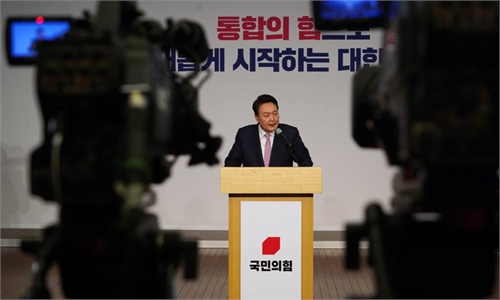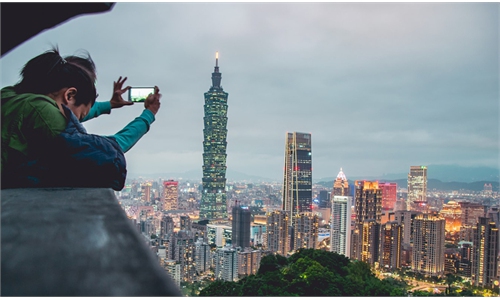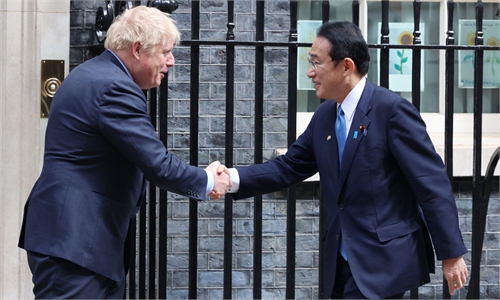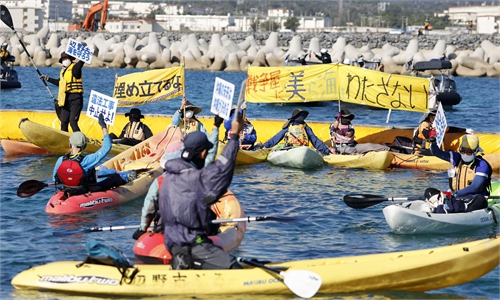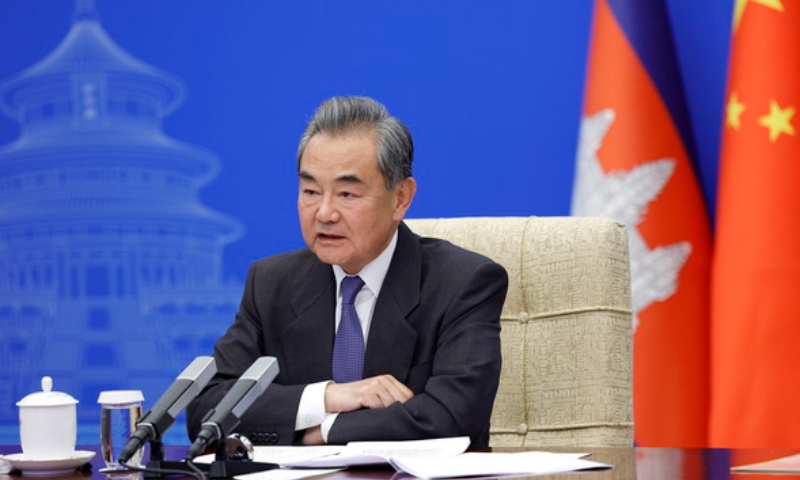
Chinese State Councilor and Foreign Minister, Wang Yi Photo: fmprc.gov.cn
Chinese senior diplomats on Wednesday stressed China's position and sent firm warnings on US and Japan's negative moves against China, following reports that Japan and the US were set to affirm boosting cooperation over the Taiwan question and compare it to the Ukraine crisis in a joint statement of an upcoming bilateral summit.China's senior diplomat Yang Jiechi noted US' recent deeds on the Taiwan question are opposite to its words. If the US continues to play the "Taiwan card" and keeps on the wrong path, China will take firm actions to safeguard its sovereignty and security interests, and "we will do what we say," Yang, a member of the Political Bureau of the Communist Party of China (CPC) Central Committee and director of the Office of the Foreign Affairs Commission of the CPC Central Committee warned in a phone call with US National Security Advisor Jake Sullivan on Wednesday.
State Councilor and Foreign Minister Wang Yi warned Japan in a virtual talk with Japanese Foreign Minister Yoshimasa Hayashi on Wednesday not to pull the chestnuts from the fire for others and take the wrong path of beggar-thy-neighbor.
Tokyo and Washington were recently active in a supportive gesture in advocating Taiwan authorities' participation to the World Health Assembly (WHA) which will commence on May 22. Chinese experts said the moves that accelerate the internationalization of the Taiwan question, including linking the Taiwan question, China's internal affairs, with the Ukraine crisis, expose the pair's sinister plot: bring disturbance to the Asia-Pacific, and tie it to the turbulence in Europe to form a larger crisis to seek benefits from it.
Citing Japanese government sources, Kyodo News reported on Tuesday that Japanese Prime Minister Fumio Kishida and US President Joe Biden will highlight "peace and stability for Taiwan," and "share concerns the Ukraine crisis could occur in East Asia" at a meeting in Tokyo on May 23.
These "concerns" are expected to be reflected in a joint statement in what would be Kishida's first in-person, sit-down bilateral summit with Biden, Kyodo News said. Japan is set to host the QUAD leaders' summit 2022 on May 24.
Japanese media said boosting the Japan-US alliance is based on the pair's cognition that China would be the top security challenge in the long run.
As for the "viewpoint that Japan and the US join hands to confront China" released even before the US leader embarks on his Japan trip, Chinese Foreign Minister Wang Yi described it as "rampant," "creating a foul atmosphere," and making people "vigilant."
Japan and the US are allies, while China and Japan have concluded a treaty of peace and friendship. Bilateral cooperation between Japan and the US should not provoke bloc confrontation, let alone harm China's sovereignty, security and development interests, Wang said in a virtual talk with Japanese Foreign Minister Yoshimasa Hayashi on Wednesday.
"China hopes that Japan will learn from historical lessons, bear in mind regional peace and stability and act prudently, rather than pull the chestnuts from the fire for others and take the wrong path of beggar-thy-neighbor," Wang noted.
Japanese media also mentioned that Kishida is expected to announce Japan's participation in the US-led Indo-Pacific Economic Framework, which is still vague in substance.
Da Zhigang, director of the Institute of Northeast Asian Studies at Heilongjiang Provincial Academy of Social Sciences, told the Global Times on Wednesday that the advance disclosure by the Japanese government through media is public opinion and cognitive warfare against China to take the initiative on internationalizing the Taiwan question.
China has done nothing but has been defined in advance by the US and Japan as "having aggressive intentions," the expert explained.
The hyping of the China threat theory serves as a deterrent and intimidation to other countries and organizations friendly to China, such as ASEAN, Da said. "The subtext is that if Taiwan island is treated as Ukraine, anyone who dares to support the Chinese mainland will face sanctions."
The highest-ranking uniformed officer in Japan's Self-Defense Forces will attend a NATO Military Chiefs of Defense meeting for the first time on Thursday, Nikkei reported, citing the Japanese defense authority. In April, US Secretary of State Antony Blinken announced that Japan will attend a NATO summit meeting in Madrid in late June.
The QUAD summit and Biden-Kishida meeting would promote NATO's Asia-Pacific orientation, a Beijing-based international affairs expert told the Global Times on condition of anonymity.
"By hyping the Taiwan question and comparing it to the Ukraine crisis, Japan and the US intend to incite European countries to shift to the Asia-Pacific region and use the Taiwan question as an issue to create aversion in Europe against China," the expert said. "This is an insidious and malicious scheme."
What Japan and the US are doing is very destructive and will lead to more regional chaos, instability and strife, the expert said. "This will not be welcomed by most countries in the Asia-Pacific region."
Dreaming different dreams
A day before Japan's advance disclosure about the summit, Chen Ming-tong, the head of security authority in Taiwan island, said the reunification of China not only includes Taiwan, but the China-Japan disputed Diaoyu Islands. "Japan is a concerned party, not a bystander, in regional security issues."
Observers said it's not difficult to see the coordination between "allies" from the successive claims from Japan and Taiwan authorities, but there is divergence in the goal they attempt to achieve.
Experts reached by the Global Times believe that the secessionist Democratic Progressive Party (DPP) authority on the island cannot achieve secession on its own strength, which means a war. By tying itself to Japan, the DPP authority wants Japan and the US to send troops to help it once war in the Taiwan Straits is triggered.
But in the event of a real war, the US and its allies would most likely be on the sidelines offering military and vocal support, while the DPP would lead Taiwan to tragedy, the Beijing-based expert said.
Similarly, by linking Taiwan to Ukraine, Japan is annotating the Ukrainization of the Diaoyu Islands: in case of war with China, Japan is confident that it can get assistance from the US and probably NATO, Da said.
As for the US-Japan relationship, Da said Washington wants to demonstrate leadership by portraying the ties with Japan as a relationship that extends beyond the Asia-Pacific region. Japan also wants to use the special relationship to strengthen its national defense and boost global influence.
But Japan is increasingly acting as a guide for the US' Asia-Pacific policy: the Indo-Pacific strategy was initially proposed by former Japanese prime minister Shinzo Abe, and the idea of introducing NATO into the Asia-Pacific was also first proposed by Abe, Da said.
In January 2007, Abe visited NATO headquarters, the first-ever by a Japanese head of government, and expressed Japan's interest to join a stronger partnership with NATO.

